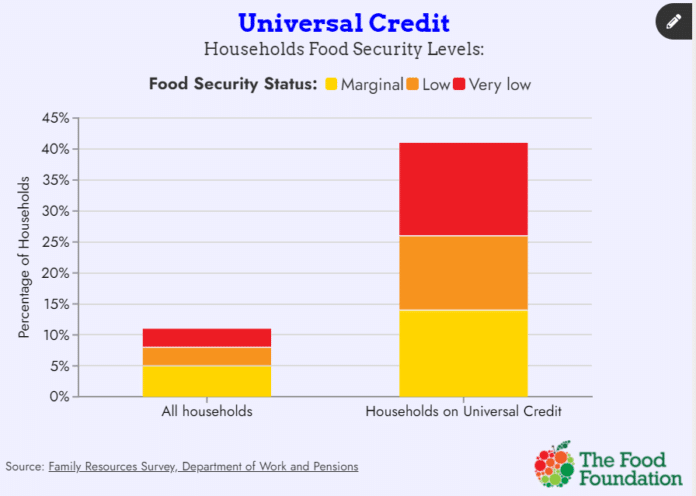The Department of Work and Pensions knows very well children and families are starving on its income. Government ministers don’t seem to care.
The Food Foundation has released a statement on the matter:
The Department of Work and Pensions Family Resources Survey of ~10,000 households measuring household food insecurity suggest that the £20 Uplift that was put in place for families on Universal Credit during the pandemic played a critical role in protecting these families from food insecurity. Compared with before the pandemic, food insecurity levels in households on UC were 37% lower (43% in 2019-21 compared with 27% in 2020-21). While these levels are still concerningly high, they suggest that the £20 made a real difference to families being able to afford the food they needed. In comparison those on housing benefit (which captures many people on legacy benefits that weren’t eligible for the uplift) saw little change, further indicating the impact of the uplift.
Despite the improvement, the levels of food insecurity were approximately four times higher in households on Universal Credit than the average household. This is despite many households on Universal Credit being in work.
Since then the £20 uplift has been removed leaving families £1000 worse off per year. The cost of living is also rising due to soaring fuel prices and food prices.
If we are to avoid worsening levels of food insecurity, urgent action is needed to combat the severe pressure on the ability of people on benefits to afford sufficient food and healthy food.
Today, both the energy bill cap and National Insurance Tax increase, putting further pressure on families’ incomes and their ability to afford food. Benefit levels will also increase tomorrow but by only 3.1%. This is far less than current inflation figures (6.2%). Inflation is projected to reach double figures by the end of the year. Government must raise benefits in line with inflation if it is to protect families from food insecurity.
The Food Foundation are calling on the Work and Pensions Committee (in parliament) to launch an urgent inquiry into what the Government is planning to do to reduce levels of household food insecurity amongst benefit claimants.
Overall food insecurity
Overall, 7% of households experienced food insecurity on average each month in 2020-21. Food insecurity levels are even higher now. The Food Foundation’s nationally representative surveys found similar levels of overall food insecurity in August 2020 (6.9%) and since then food insecurity levels have increased by 27%.
The increasing cost of living – including rising food prices – is likely to mean that people become more reliant on lower cost foods which require minimal cooking and which tend to be calorie-dense and nutrient-poor, further increasing diet-related disease. Poor diets are one of the leading causes of avoidable harm to our health. Therefore, reducing food insecurity levels will be integral to achieving the Government’s Levelling Up mission to improve healthy life expectancy and to reduce health disparities.
Anna Taylor, Executive Director of The Food Foundation said: “There is now an abundance of evidence to show that households on universal credit (which are working families), are at extreme risk of food insecurity. In the absence of support from the Government to help with the cost of living crisis, the consequences could be catastrophic for many of these families, with material impacts on their health and wellbeing.”







